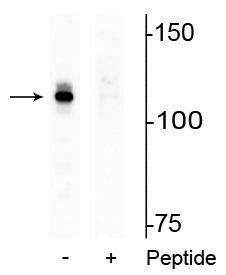Anti-Androgen Receptor (Ser94) Antibody
Our Anti-Androgen Receptor (Ser94) rabbit polyclonal phosphospecific primary antibody from PhosphoSo
- SPECIFICATION
- CITATIONS
- PROTOCOLS
- BACKGROUND

| Primary Accession | P10275 |
|---|---|
| Host | Rabbit |
| Clonality | Polyclonal |
| Isotype | IgG |
| Calculated MW | 99188 Da |
| Gene ID | 367 |
|---|---|
| Other Names | AIS antibody, ANDR_HUMAN antibody, Androgen nuclear receptor variant 2 antibody, Androgen receptor (dihydrotestosterone receptor; testicular feminization; spinal and bulbar muscular atrophy; Kennedy disease) antibody, Androgen receptor antibody, androgen receptor splice variant 4b antibody, AR antibody, AR8 antibody, DHTR antibody, Dihydro testosterone receptor antibody, Dihydrotestosterone receptor (DHTR) antibody, Dihydrotestosterone receptor antibody, HUMARA antibody, HYSP1 antibody, KD antibody, Kennedy disease (KD) antibody, NR3C4 antibody, Nuclear receptor subfamily 3 group C member 4 (NR3C4) antibody, Nuclear receptor subfamily 3 group C member 4 antibody, SBMA antibody, SMAX1 antibody, Spinal and bulbar muscular atrophy (SBMA) antibody, Spinal and bulbar muscular atrophy antibody, Testicular Feminization (TFM) antibody, TFM antibody |
| Target/Specificity | The androgen receptor (AR) is a DNA-binding transcription factor that regulates genes critical for the development and maintenance of the male sexual phenotype. Defects in androgen receptor have been shown to play a role in prostate cancer, and inhibition of AR activity through modulation of signal transduction pathways may delay prostate cancer progression (Heinlein and Chang 2004). Multiple phosphorylation sites have been identified on the androgen receptor that affect cross-talk between growth factor signaling and androgen in prostate development and cancer (Gioeli et al., 2002). One of these sites, at Ser94, appears constitutively phosphorylated and exhibits no response to treatments with stimulating hormone (Gioeli et al., 2002). The site at Ser94 is unique among the AR phosphorylation sites in that it does not achieve a maximal level of phosphorylation between translation and the initial round of nuclear import, having a strong bias for androgen-independent phosphorylation in the cytoplasm (Kesler et al., 2007). |
| Format | Antigen Affinity Purified from Pooled Serum |
| Storage | Maintain refrigerated at 2-8°C for up to 6 months. For long term storage store at -20°C in small aliquots to prevent freeze-thaw cycles. |
| Precautions | Anti-Androgen Receptor (Ser94) Antibody is for research use only and not for use in diagnostic or therapeutic procedures. |
| Shipping | Blue Ice |

Thousands of laboratories across the world have published research that depended on the performance of antibodies from Abcepta to advance their research. Check out links to articles that cite our products in major peer-reviewed journals, organized by research category.
info@abcepta.com, and receive a free "I Love Antibodies" mug.
Provided below are standard protocols that you may find useful for product applications.
Background
The androgen receptor (AR) is a DNA-binding transcription factor that regulates genes critical for the development and maintenance of the male sexual phenotype. Defects in androgen receptor have been shown to play a role in prostate cancer, and inhibition of AR activity through modulation of signal transduction pathways may delay prostate cancer progression (Heinlein and Chang 2004). Multiple phosphorylation sites have been identified on the androgen receptor that affect cross-talk between growth factor signaling and androgen in prostate development and cancer (Gioeli et al., 2002). One of these sites, at Ser94, appears constitutively phosphorylated and exhibits no response to treatments with stimulating hormone (Gioeli et al., 2002). The site at Ser94 is unique among the AR phosphorylation sites in that it does not achieve a maximal level of phosphorylation between translation and the initial round of nuclear import, having a strong bias for androgen-independent phosphorylation in the cytoplasm (Kesler et al., 2007).
If you have used an Abcepta product and would like to share how it has performed, please click on the "Submit Review" button and provide the requested information. Our staff will examine and post your review and contact you if needed.
If you have any additional inquiries please email technical services at tech@abcepta.com.













 Foundational characteristics of cancer include proliferation, angiogenesis, migration, evasion of apoptosis, and cellular immortality. Find key markers for these cellular processes and antibodies to detect them.
Foundational characteristics of cancer include proliferation, angiogenesis, migration, evasion of apoptosis, and cellular immortality. Find key markers for these cellular processes and antibodies to detect them. The SUMOplot™ Analysis Program predicts and scores sumoylation sites in your protein. SUMOylation is a post-translational modification involved in various cellular processes, such as nuclear-cytosolic transport, transcriptional regulation, apoptosis, protein stability, response to stress, and progression through the cell cycle.
The SUMOplot™ Analysis Program predicts and scores sumoylation sites in your protein. SUMOylation is a post-translational modification involved in various cellular processes, such as nuclear-cytosolic transport, transcriptional regulation, apoptosis, protein stability, response to stress, and progression through the cell cycle. The Autophagy Receptor Motif Plotter predicts and scores autophagy receptor binding sites in your protein. Identifying proteins connected to this pathway is critical to understanding the role of autophagy in physiological as well as pathological processes such as development, differentiation, neurodegenerative diseases, stress, infection, and cancer.
The Autophagy Receptor Motif Plotter predicts and scores autophagy receptor binding sites in your protein. Identifying proteins connected to this pathway is critical to understanding the role of autophagy in physiological as well as pathological processes such as development, differentiation, neurodegenerative diseases, stress, infection, and cancer.


